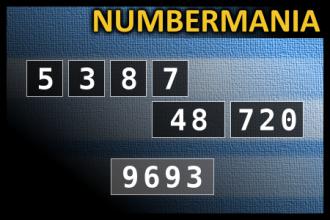Calculate the number 9693
NUMBERMANIA: Calculate the number 9693 using numbers [5, 3, 8, 7, 48, 720] and basic arithmetic operations (+, -, *, /). Each of the numbers can be used only once.Correct answers: 30
The first user who solved this task is Sanja Šabović.
#brainteasers #math #numbermania

An Irishman, an Italian, and a...
An Irishman, an Italian, and a Polish guy are in a bar. They are having a good time and all agree that the bar is a nice place.
Then the Irishman says, "Aye, this is a nice bar, but where I come from, back in Dublin, there's a better one. At McDougal's, you buy a drink, you buy another drink, and McDougal himself will buy your third drink!" The others agree that sounds like a nice place.
Then the Italian says, "Yeah, that's a nice bar, but where I come from, there's a better one. Over in Brooklyn, there's this place, Vinny's. At Vinny's, you buy a drink, Vinny buys you a drink. You buy another drink, Vinny buys you another drink." Everyone agrees that sounds like a great bar.
Then the Polish guy says, "You think that's great? Where I come from, there's this place called Warshowski's. At Warshowski's, they buy you your first drink, they buy you your second drink, they buy you your third drink, and then, they take you in the back and get you laid!"
"Wow!" say the other two. "That's fantastic! Did that actually happen to you?"
"No," replies the Polish guy, "but it happened to my sister!"
Then the Irishman says, "Aye, this is a nice bar, but where I come from, back in Dublin, there's a better one. At McDougal's, you buy a drink, you buy another drink, and McDougal himself will buy your third drink!" The others agree that sounds like a nice place.
Then the Italian says, "Yeah, that's a nice bar, but where I come from, there's a better one. Over in Brooklyn, there's this place, Vinny's. At Vinny's, you buy a drink, Vinny buys you a drink. You buy another drink, Vinny buys you another drink." Everyone agrees that sounds like a great bar.
Then the Polish guy says, "You think that's great? Where I come from, there's this place called Warshowski's. At Warshowski's, they buy you your first drink, they buy you your second drink, they buy you your third drink, and then, they take you in the back and get you laid!"
"Wow!" say the other two. "That's fantastic! Did that actually happen to you?"
"No," replies the Polish guy, "but it happened to my sister!"

